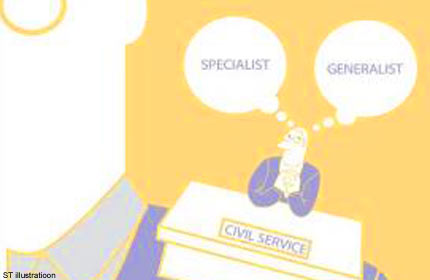
SINGAPORE - Last month, the civil service announced a new Public Service Leadership (PSL) programme, to allow specialists in fields across five broad sectors to be groomed as future leaders.
The five fields are economy building, infrastructure and environment, security, social, and central administration.
That stands in contrast to the current Administrative Officers' scheme - which trains generalists to be leaders.
The details are still being ironed out, yet the change appears good for at least two reasons.
The first is that it should help the civil service retain talent better, and will create a wider, more competitive leadership pool.
The recent lack of changes to civil service pay is an indication that the Government continues to face tough competition for talent.
Competitive salaries aside, the latest PSL programme is an admission that specialists need to be rewarded and recognised, and have a part to play in making key decisions and leading a large organisation like the civil service.
As one civil servant, formerly on the management associate programme, said: "It might make me consider staying on if I don't get absorbed into the Admin Service."

With the new PSL programme, those who do not make the cut for the elite Administrative Service will still have a chance at a leadership post.
The second reason is that the PSL programme should lead to better policymaking. It is an implicit recognition of the limits of generalist leaders, whose strength is their breadth of knowledge rather than depth.
As governance and policymaking become more complex, "we need to redefine and then broaden our concept of leadership to encompass a broader group of people", civil service head Peter Ong said in a recent interview.
He added: "When you enter a more complex world with a lot of volatility, uncertainty, complexity and ambiguity, you need people with different perspectives, people with wider perspectives to complement the leadership team."
He cited population policy as an example.
To craft such policies, one needs statisticians who understand demographic trends, economists who appreciate the impact of changes to manufacturing and other parts of the economic structure, population experts who understand the science behind the total fertility rate and architects and town planners to draw up land use plans.
Another civil servant wondered about MRT breakdowns, and whether having more specialist leaders within the Land Transport Authority might have prevented the breakdowns or led to a faster response when trains stopped.
That is a question the PSL programme could address in future.
However, several challenges lie ahead.
One key challenge of implementation is to make sure that specialists are not pitted against generalists but that both can work together.
Mr Ong said the aim is for specialist leaders to complement the generalists, not replace them.
The generalist versus specialist debate has a simple answer anyway: organisations need both.
That is why the PSL programme is deliberately porous, so that a specialist can still join the Administrative Service and become a generalist, while a generalist can also choose to be a specialist.
Another key challenge is to address the perception that the sole track to the top is still ultimately through the Administrative Service.
The proof of the pudding will be in how many PSL programme leaders eventually make it to top leadership positions, as compared to Admin Service officers.
These changes may not remove some perceptions that the civil service is still run by a group of elites. But that may be the service's cross to bear.
A third and wider challenge is that the civil service needs more openness and diversity in order to create a culture of innovation and entrepreneurship.
This may not be achieved by the PSL or Admin Service alone.
That can come about by embracing the idea of shared leadership - leadership that is not defined by positions and ranks but by whoever in the organisation has ideas and skills.
That will be a challenge because the biggest problem with any bureaucracy is inertia and the tendency to do things as before.
Former British prime minister Tony Blair joked at a discussion at the World Economic Forum in Myanmar yesterday that while he was in government, he realised the civil service is a "conspiracy of conservatism", given how much resistance there is to change. And he called exactly for this need to embrace new ideas.
But the impetus for change is clear as Singapore enters a new phase of its development - it is no longer business as usual.
A culture of shared leadership, practised by innovative organisations like Google, will also allow room for the emergence of civil service entrepreneurs or mavericks of the past like the Philip Yeos, JY Pillays and Lim Siong Guans. These were men who were not afraid to tackle problems in new and innovative ways.
As Singapore enters a new era, the changes are occurring across its politics, economy and society - the demands ever more difficult to meet.
Therefore the type of civil servants and their abilities, and how they craft and shape policies cannot remain the same, and the organisation must continue to strive to innovate.
chanckr@sph.com.sg


